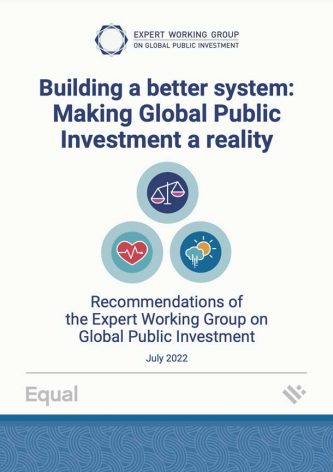Global Public Investment: Time to Build the Movement Now

KUALA LUMPUR, Malaysia, Aug 17 (IPS) - Global Public Investment. A short and simple phrase. But one that means so much.
At its most basic, GPI means public money being used to invest in goods and services that are of global benefit. There is no shortage of goods and services that need GPI, whether they be used to prevent or respond to environmental catastrophe, international war and conflict, or the next pandemic.
We live on a single, small and fragile planet and greater levels of GPI are needed to help us look after our planet; and invest in the global institutions and services needed to provide security and health for all.
This is why over the last few years a group of committed individuals and organizations have worked to establish new ideas and thinking around GPI. Following an extensive period of consultation and discussion, an Expert Working Group has just produced a report on how we make GPI a reality.
The report describes the need for GPI, and how governments may contribute and participate in the governance and effective use of public finance for the common good.
Importantly, GPI offers a new model of development finance that can replace the ineffective and colonial forms of donor aid with an approach that is based on true multilateralism, fairness and shared benefit. Central to the idea of GPI is a simple slogan: all contribute, all benefit, all decide.
Nothing perhaps illustrates the need for GPI than the new fund being created to finance pandemic prevention, preparedness and response. The fund, to be managed by the World Bank, has been built to fail according to many experts because of structural flaws that consolidate decision-making power in the hands of a small group of wealthy nations and philanthropies.
The English-language launch of the Expert Working Group’s report on July 27th took the form of a brief presentation of the history and principles of GPI followed by a three-woman panel discussion. Helen Clark (former prime minister of New Zealand), Jayati Ghosh (Professor of Economics at the University of Massachusetts) and Marianna Mazzucato (Professor of the Economics of Innovation and Public Value) each spoke to the relevance of GPI.
Importantly, the panel noted that for the GPI funding model to work, it must be accompanied by other political and economic efforts. These include restoring and rebuilding the status and capabilities of public departments and institutions after decades of neoliberal attacks on the public sector as well as ‘in-sourcing’ critical public functions that have been commercialized and privatised.
The panel also noted the need to rise to the political challenge of reforming the financial system so that enough public funding can be generated and so that we can better redistribute wealth across society.
This will require, among other things, an end to the tax abuses perpetrated or enabled by trans-national corporations, banks, accountancy firms and corrupt officials.
While the panel focused its discussion on GPI, the broader financialization of society and the role of private finance was not neglected. Indeed, it was argued that private finance needs to be part of the solution to meeting society’s needs. But equally, laws and regulations are needed to stop the social and environmental caused by the rapacious, short-term and unregulated flows of private finance capital that have grown over the past few decades.
It’s clear that transformative and structural social, political and economic is needed if we are to succeed in rescuing the planet, democracy and civilization from further degradation.
Is GPI one element of the new social, political and economic structural settlement that we need? I think it is. But see for yourself.
Professor Dr David McCoy is a public health doctor and currently a Research Lead at the UN University International Institute for Global Health (UNU-IIGH). Follow him on Twitter @dcmccoy11.
IPS UN Bureau
Follow @IPSNewsUNBureau
Follow IPS News UN Bureau on Instagram
© Inter Press Service (2022) — All Rights Reserved. Original source: Inter Press Service
Where next?
Browse related news topics:
Read the latest news stories:
- Forest Guards Risking Their Lives To Keep Malawi’s Forests Standing Monday, March 31, 2025
- Global Climate Action Progressing, but Speed and Scale Still Lacking Monday, March 31, 2025
- ‘Student Protests Have Sparked Solidarity, Empathy and a Renewed Belief in Collective Action’ Monday, March 31, 2025
- Southeast Asia’s Economies Can Gain Most by Packaging Ambitious Reforms Monday, March 31, 2025
- Myanmar earthquake tragedy ‘compounds already dire crisis’ Monday, March 31, 2025
- Gaza: UN relief chief demands ‘answers and justice’ following killings of first responders Monday, March 31, 2025
- Myanmar earthquake: Search and rescue efforts continue in race against time Sunday, March 30, 2025
- Looking beyond GDP to reach the Sustainable Development Goals Saturday, March 29, 2025
- UN chief strongly condemns killing of Kenyan peacekeeper in Central African Republic Saturday, March 29, 2025
- Myanmar quake: More than 1,600 reported killed, as UN aid operation supports rescue efforts Saturday, March 29, 2025